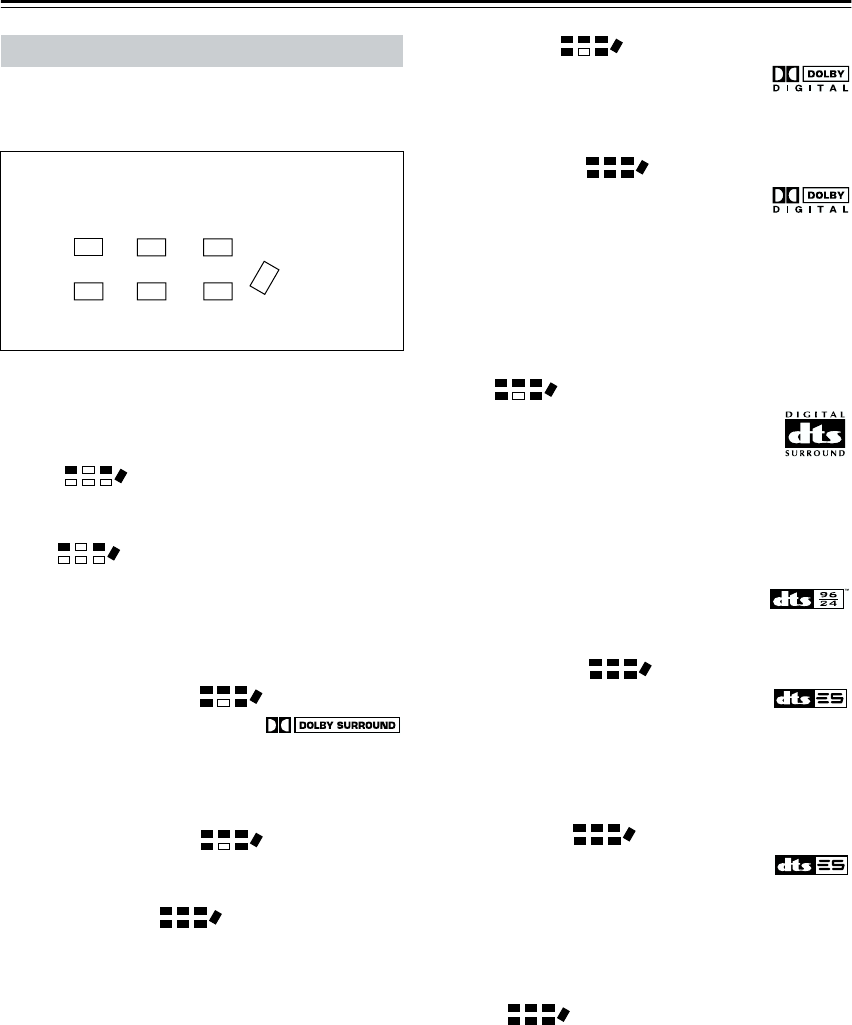
46
Using the Listening Modes—Continued
With its surround-sound decoders and DSP modes, the
AV receiver can transform your home listening room
into a movie theater or concert hall.
Direct
In this mode, the input source is output as it is, with min-
imal processing for a faithful sound. The bass and treble
functions are bypassed.
Stereo
In this mode, the input source is output by the front left
and right speakers and subwoofer.
Mono
Use this mode when watching an old movie with a mono
soundtrack, or to select the foreign language soundtracks
recorded in the left and right channels of some movies.
It can also be used with DVDs or other sources contain-
ing multiplexed audio, such as karaoke DVDs.
Dolby Pro Logic II Movie
Use this mode with DVDs and vid-
eos that bear the Dolby Surround
logo, or TV shows that feature Dolby Surround. You can
also use it to create 5.1 surround from stereo movies and
TV shows.
Dolby Pro Logic II Music
Use this mode to create 5.1 surround from stereo music
sources, such as CDs and DVDs.
Dolby Pro Logic IIx
If you’ve connected surround back speakers to the AV
receiver, Dolby Pro Logic IIx can create 7.1 surround
from stereo music or 5.1 movies. Dolby Pro Logic IIx
offers a well defined, natural multichannel surround-
sound experience, putting the listener in a seamless enve-
lope of sound. The added drama and natural sound
enhances the listening experience with music, movies,
and games.
Dolby Pro Logic IIx has three modes of operation: Movie
mode for watching movies, Music mode for listening to
music, and Game mode for playing games on a games
console with stereo outputs.
Dolby Digital
With Dolby Digital, you can experience
the same thrilling sound that you get at a
movie theater or concert hall. Use this mode with DVDs
that bear the Dolby Digital logo.
Dolby Digital EX
Dolby Digital EX includes a surround-
back channel, for 6.1 surround. It offers a
heightened sense of space, and added real-
ism with moving sounds, especially those that move
360 degrees or fly overhead. Dolby Digital EX can also
be enjoyed on a 5.1 system, in which case the surround-
back channel sound is split between the surround left and
surround right speakers. Use this mode with DVDs that
feature 5.1 and bear the Dolby Digital logo.
DTS
This format offers a surround sound experi-
ence with exceptional fidelity. It offers six
discrete channels for 5.1 surround, and uses
less compression for a truly faithful sound.
You’ll need a DTS-capable DVD player to enjoy DTS
material. Use this mode with DVDs and CDs that bear
the DTS logo.
DTS 96/24
This mode offers very high audio quality.
Use it with CDs and DVDs that bear the
DTS 96/24 logo.
DTS-ES Discrete
This is DTS with an added surround back
channel for 6.1 surround. With the addi-
tional surround back channel, it offers seven independent
digital channels, providing a real sense of movement and
space. Use it with CDs and DVDs that feature DTS 6.1
and bear the DTS-ES logo.
DTS-ES Matrix
This is DTS with a surround back channel
for 6.1 surround. Use it to create 6.1 sur-
round from DTS 5.1 material. Since DTS 5.1 material
already contains surround back channel information, the
back channel can be reconstructed for real 6.1 surround.
Use this mode with CDs and DVDs that bear the DTS-
ES.
Neo:6
This mode creates 6.1 surround from stereo sources. It
offers six full-bandwidth channels and excellent separa-
tion. There are two modes of operation: Cinema mode
for watching movies, and Music mode for listening to
music.
Cinema mode simulates the realistic sense of movement
that you get with 6.1 surround. Use it with videos,
DVDs, and TV shows that feature stereo sound.
Music mode uses the surround channels to simulate a
natural sound field, something that cannot be done with
conventional stereo. Use it with stereo sources and music
CDs.
About the Listening Modes
The AV receiver’s surround indicators show which
speakers are active in each listening mode.
Front left Center Front right
Subwoofer
Surround
right
Surround
back left/
right
Surround
left


















